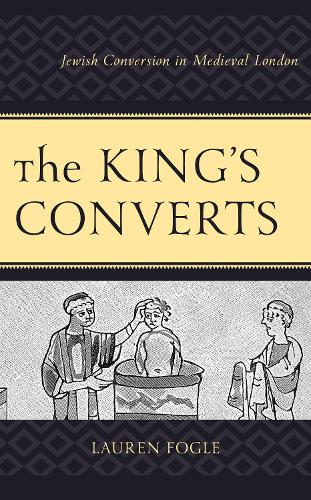
The King's Converts: Jewish Conversion in Medieval London
(Hardback)
Publishing Details
The King's Converts: Jewish Conversion in Medieval London
By (Author) Lauren Fogle
Bloomsbury Publishing PLC
Lexington Books
26th November 2018
United States
Classifications
Professional and Scholarly
Non Fiction
History of religion
248.2466009421
Physical Properties
Hardback
250
Width 160mm, Height 229mm, Spine 19mm
467g
Description
In the Middle Ages, Jews who converted to Christianity occupied a shadowy and often dangerous place between the two religions. Rejected by their former community, and sometimes not accepted fully as Christians, converts were often destitute and at the mercy of noble benefactors. Only in London was there an official, royally sanctioned and funded, policy of conversion. When Henry III founded the Domus Conversorum, in 1232, he created a unique institution, one intended to house, protect, and instruct converts from Judaism. This book provides an analysis of Jewish conversion in England and continental Europe in the 12th and 13th centuries and offers a detailed look at Londons Domus Conversorum: its finances, its administration, and its inhabitants. Using royal records, financial accounts and receipts, Church letters and documents, London wills and assizes, and chronicles, this book presents the most in depth account of Jewish conversion in London to date.
Reviews
In this original book dealing with the Jewish community in medieval London, Dr. Fogle has particularly focused on those Jews who broke faith and apostatized. She examines the pressures (or inducements) that were brought to bear on the London Jews and their treatment once they had become conversi. In this study, she has been able to shed light on the attitudes to Jews prevailing among the London population, and reveals for the first time the distinctiveness of the policies pursued by Henry III and later English kings. In her research Dr Fogle made the unexpected discovery that the house in London founded by Henry III for converted Jews the Domus Coversorum - continued to be important to refugee Jews from all over Europe well into the sixteenth century: its significance clearly did not end with the expulsion of the Jews in 1290. This important study throws new light not only on the Jews themselves but also on the communities in which they lived and, on occasion, prospered. -- Caroline Barron, Royal Holloway, University of London
Author Bio
Lauren Fogle is visiting lecturer in history at the University of Massachusetts Lowell.
